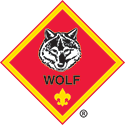 Wolf (2nd grade)
Wolf (2nd grade)
Scouts in second grade are Wolf Scouts and work toward the Wolf Rank by completing six required adventures, one choice adventure, one elective adventure, and a few other requirements. A Scout may complete as many elective adventures as their ambition and time allow.
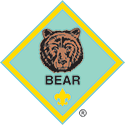 Bears (3rd grade)
Bears (3rd grade)
Scouts in third grade are Bear Scouts and work toward the Bear Rank by completing six required adventures, one choice adventure, one elective adventure, and a few other requirements. A Scout may complete as many elective adventures as their ambition and time allow.
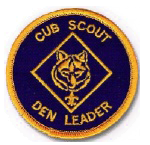 A cornerstone of Scouting America programs is training, and a variety of convenient training is available for every parent volunteer and leader. Some of these training courses are conducted by different districts, and some by the council; others are available online. As a new leader, you can learn all about Scouting and the wonderful adventure your child is about to experience.
A cornerstone of Scouting America programs is training, and a variety of convenient training is available for every parent volunteer and leader. Some of these training courses are conducted by different districts, and some by the council; others are available online. As a new leader, you can learn all about Scouting and the wonderful adventure your child is about to experience.
Every den leader should take both Fast Start and Youth Protection Training online before the first den meeting. Leaders should then take Den Leader Position-Specific Training for their position and Hazardous Weather as soon as possible.
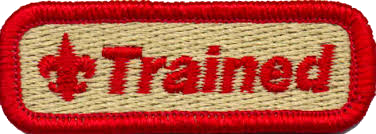 Fast Start Orientation Training is intended to be taken by leaders immediately following the acceptance of their new role, and is offered online.
Fast Start Orientation Training is intended to be taken by leaders immediately following the acceptance of their new role, and is offered online.- Safeguarding Youth Training (SYT) is the required child-abuse prevention and detection course.
- Den Leader Position-Specific Training provides the specialized knowledge a new leader needs to assume a leadership role. Den leaders are provided with the information and tools needed to conduct successful den meetings. Take this training online or find a classroom version of the course near you.
- Hazardous Weather Training. Weather conditions are an important factor in any outdoor Scouting activity. The online training is designed to help participants plan and prepare for hazardous weather.
Supplemental Training
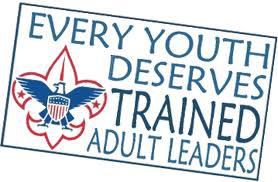
- Basic Adult Leader Outdoor Opportunity (BALOO) is the Cub Scout leader training required for any Webelos den overnighters. BALOO training is now comprised of two components* – an online component, and a practical, hands-on component. Both components must be completed to qualify as a “Trained” Cub Scout outdoor leader and to receive the BALOO recognition patch. The online component contains introductory and basic information and must be completed prior to the practical component at my.scouting.org. The practical component is an overnight that takes about 16-hours to complete. Bear leaders are encouraged to take BALOO in the spring to prepare to become a Webelos den leader. Find a course near you.
- Cubcast podcasts are monthly audio presentations that provide information on topics of interest to Cub Scout leaders.
- Cub Scout Roundtable is conducted monthly in each district.
- Safety Trainings are offered online such as Safe Swim Defense and Safety Afloat
- This is Scouting provides an overview of the Scouting organization, including history, values, programs, Youth Protection, community involvement, and training. The module consists of six video sections, each followed by a brief quiz and can be taken online.
- University of Scouting (spring and fall) is a one-day of workshops for parents and leaders to help you make sure your child gets the most out of the Cub Scout program! The training is held a Houston-area high school. Over 50 classes are offered on topics such as awards, crafts, games, songs, skits, outdoor cooking, derbies, den meeting ideas, field trips, pack committee resources, pack meeting ideas and more. Leaders and parents can increase their knowledge, improve their skills, and gain enthusiastic attitudes about Cub Scouting. Participants choose from a wide variety of activity and learning sessions and walk away with useful resources and tons of ideas!
- Wood Badge is advanced leadership training.
About Online Training
There are many training courses that can be taken online at My.Scouting.org.
 Create an account - this can be done with or without your membership ID.
Create an account - this can be done with or without your membership ID.- If you enter your membership ID, your training records will be updated at the council office.
- If you are not yet registered, you can still take training, just print the certificate at the end of each course.
- After your account is created you will receive an email with a link. Click the link to activate your My.Scouting.org account. This must be done before you can log in. If you do not receive an email, check your spam/junk folder.
- Once you log in to My.Scouting.org, click E-Learning on the left-hand side. Program-related trainings are listed under tabs.
- Submit your certificate of completion to your district training chair.
- Click on training validation to review what courses you have taken, this includes courses recorded at the council office.
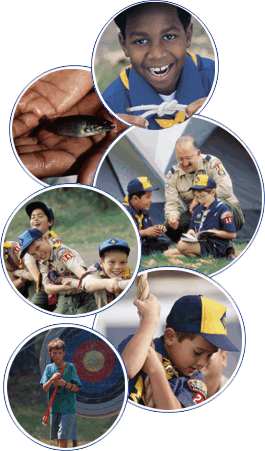 The Sam Houston Area Council offers a variety of events in which dens and packs are invited to participate. Districts also offer activities in your area. Here are a few you will not want to miss:
The Sam Houston Area Council offers a variety of events in which dens and packs are invited to participate. Districts also offer activities in your area. Here are a few you will not want to miss:
Fun with Family (October) is an overnight campout for all new Cub Scouts. Cub Scouts will enjoy participating in BB guns, archery, crafts, games and more. Individual families can register for this event. Encourage your newly registered Cub Scouts to attend.
Day of Service is our annual Good Turn project. Your pack leadership will have more details about the event.
Camping
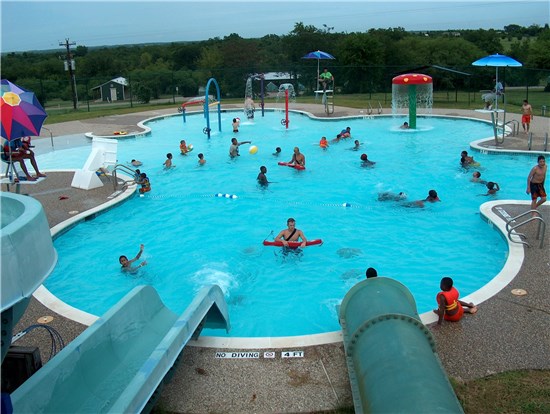 The Sam Houston Area Council offers many camping opportunities for Cub Scouts. Packs and districts offer additional camping opportunities.
The Sam Houston Area Council offers many camping opportunities for Cub Scouts. Packs and districts offer additional camping opportunities.
Day Camp (June) is hosted by districts in your area. Scouts earn rank advancements, shoot BB guns and archery, learn Scout skills, play sports and games and make crafts. Individual Scouts can register for this awesome opportunity. Day camps are held in June for four to five days and are held at various times during the day. You can attend a camp hosted by any district so find a camp that is convenient to your summer schedule.
Adventure Camp (year-round) is a weekend campout for packs, dens, and families. Admission includes three meals in the dining hall. Camp staff help parents lead activities such as BB guns, archery, a water park, and one or two program areas. Check with your pack leadership for more information.
Family Camping opportunities are available for Webelos dens and packs to camp at council camps. Packs organize their own activities. Check with your pack leadership for more information.
Scout Safely. Scouting America puts the utmost importance on the safe and healthy environments for its youth membership. Learn more about integrating health and safety into everything we do. Read the Safe Checklist, Age-Appropriate Guidelines and the Guide to Safe Scouting.
Know Then Sew. When you’re properly uniformed, you set an example for your Scouts and have a place to display the awards you receive (patches aren’t just for the youth). Yes, uniforms can be expensive, but many packs, troops, and crews have closets of “experienced” uniforms that you may use. Don’t like to sew? Try Badge Magic (bit.ly/badgemagickit).
Before you start sewing on patches, get things in the right place the first time. The Guide to Awards and Insignia presents detailed information to enable members to wear the correct and complete uniform on all suitable occasions. The uniform website is also a great resource as well as the uniform inspection sheets:
Get to Know Your Scouts … You’ll be spending lots of time with them, so find out where they go to school, what they like and dislike, and how you can best contact them (phone, email, Facebook, etc.). … and Their Parents. What are their hobbies and talents? Who can haul the youth to camp? Any Eagle Scouts in the group? Give every parent a little job and your job won’t seem so big.
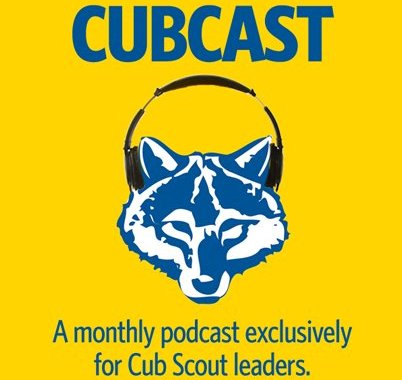 Popular Podcasts. Tune into the monthly Cub Cast and Scout Cast audio recordings that delve into topics you’ll find useful, such as recruiting, unit management and much more.
Popular Podcasts. Tune into the monthly Cub Cast and Scout Cast audio recordings that delve into topics you’ll find useful, such as recruiting, unit management and much more.
Nights at the Roundtable. Roundtable is where you’ll find a bunch of Scouters who’ve been in your shoes and are eager to help you be successful. Some of the best discussions happen after the closing, so plan to stay late. Find your district dates and locations.
Stay Current. In addition to Scouting magazine, check out scouting.org/programupdates for new program-related news.
Less Taxing. If you itemize your taxes, you can deduct the cost of your uniforms and the miles you drive as a volunteer. You’ll need good records, so start a receipt file and mileage log. For more information, visit bit.ly/scoutingwriteoffs or consult your tax adviser.
Get a Life — or snag your Scout’s copy when they are not looking. Scout Life magazine content aligns with pack and troop programs, and the jokes are always good for a laugh. For a quick game, create a scavenger hunt where youth look for specific words or pictures in the current issue.
 Follow Us. Follow the Sam Houston Area Council on Facebook and on Pinterest. Follow Scouting America on Facebook, Twitter and Instagram. Visit Cub Hub at cubscouts.org and follow Cub Scouting on Facebook, Twitter, Instagram and Pinterest.
Follow Us. Follow the Sam Houston Area Council on Facebook and on Pinterest. Follow Scouting America on Facebook, Twitter and Instagram. Visit Cub Hub at cubscouts.org and follow Cub Scouting on Facebook, Twitter, Instagram and Pinterest.
Meet and Greet: Seek out your chartered organization representative, the volunteer who oversees Scouting at your chartered organization (the school, community group, or religious institution that sponsors your unit). Ask how Scouting supports the organization’s mission and what your unit can do to help. This is especially important if you’re the unit leader or committee chair.
Subscribe to Scouting Magazine. Want to know what’s going on in the Scouting world? Stay in-the-know with the Scouting magazine blog, Bryan on Scouting. You can subscribe to receive each post in your inbox — making sure you never miss a beat.
 Find your local Scout Shop to get all of your Scouting supplies. There are five locations to serve you! Find a Scout Shop near you. Visit www.scoutstuff.org when your Scout Shop is closed and have your items shipped directly to your home.
Find your local Scout Shop to get all of your Scouting supplies. There are five locations to serve you! Find a Scout Shop near you. Visit www.scoutstuff.org when your Scout Shop is closed and have your items shipped directly to your home.
Council Newsletter. The eScouter is a monthly newsletter containing information about upcoming council events and activities.
Questions
The pack is a group of 1st - 5th grade dens. Each pack has several volunteers who can help and answer questions. The cubmaster is a volunteer who provides leadership, emcees the monthly pack meeting and plans and carries out the pack program. The pack committee chair is a volunteer who presides over the monthly pack committee meetings and recruits adults to perform administrative functions of the pack.
Districts
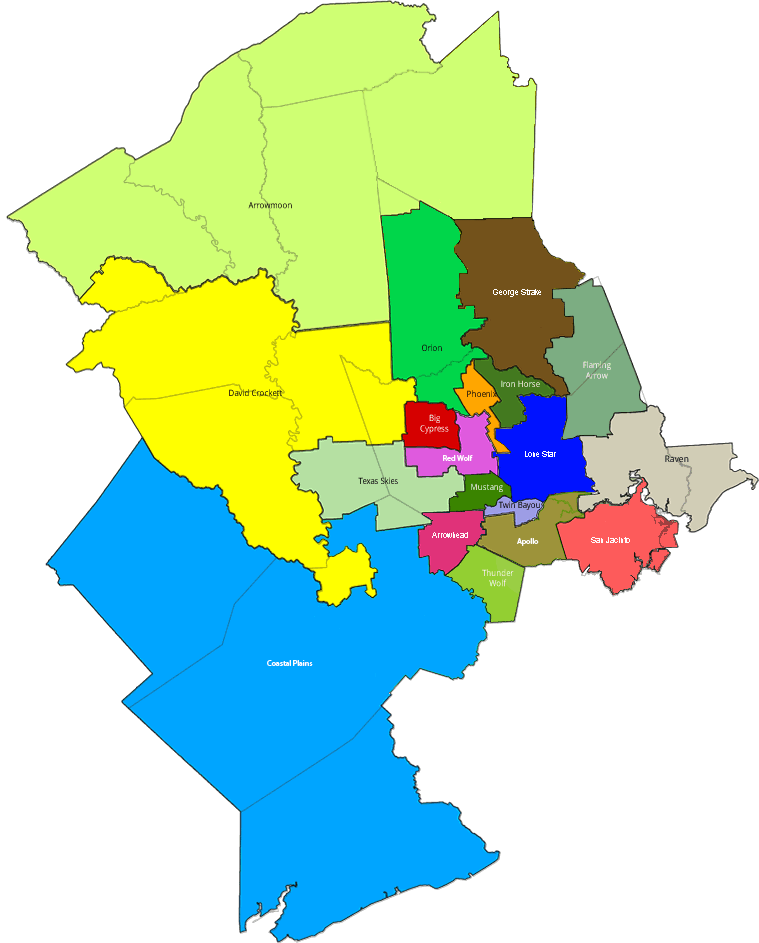 The Sam Houston Area Council is divided into geographic districts. Each district is served by at least one professional staff member -- district executive and/or district director. The district is a division of the council that helps bring Scouting to your local area. Districts focus on membership, unit support, fundraising, training, district activities and promoting advancement and camping. There are a variety of volunteers on the district committee who can help including the district training chair, district advancement chair, district activities chair, and district finance chair. Commissioners are volunteers who help Scout units succeed and can be a valuable resource. Each district has a district executive who is a Scouting professional available to answer your questions and can help explain Scouting America policies.
The Sam Houston Area Council is divided into geographic districts. Each district is served by at least one professional staff member -- district executive and/or district director. The district is a division of the council that helps bring Scouting to your local area. Districts focus on membership, unit support, fundraising, training, district activities and promoting advancement and camping. There are a variety of volunteers on the district committee who can help including the district training chair, district advancement chair, district activities chair, and district finance chair. Commissioners are volunteers who help Scout units succeed and can be a valuable resource. Each district has a district executive who is a Scouting professional available to answer your questions and can help explain Scouting America policies.
Locate your District
Rountable
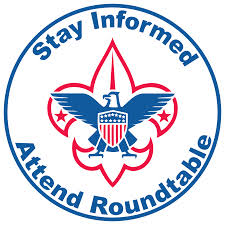 A good place to meet district volunteers and other leaders in your area is at the district monthly roundtable meeting. Roundtable is a monthly program offered by districts that gives leaders hands-on experience and provides a forum for leaders to offer and receive help from their fellow Scouters. Roundtable is a form of supplemental training for volunteers. The objective of Roundtable is to give leaders program ideas, information on upcoming events and trainings, and an opportunity to share experiences and enjoy fun and fellowship with other Scouting leaders. As a result of the roundtable experience, unit leaders will be inspired, motivated, informed, and able to provide a stronger program for their Scouts.
A good place to meet district volunteers and other leaders in your area is at the district monthly roundtable meeting. Roundtable is a monthly program offered by districts that gives leaders hands-on experience and provides a forum for leaders to offer and receive help from their fellow Scouters. Roundtable is a form of supplemental training for volunteers. The objective of Roundtable is to give leaders program ideas, information on upcoming events and trainings, and an opportunity to share experiences and enjoy fun and fellowship with other Scouting leaders. As a result of the roundtable experience, unit leaders will be inspired, motivated, informed, and able to provide a stronger program for their Scouts.
Find a Roundtable
There are typically separate sessions for Cub Scouts. The Cub Scout Roundtable provides information about the upcoming month’s planned program theme. Leaders are encouraged to share their questions, their successes and their failures (usually the latter is the most instructive!). Helping the Scouting leader, is the sole purpose of roundtable.
Who should attend? Everybody! Roundtable is designed for all leaders – Scoutmasters, Cubmasters, den leaders, committee members, assistant Scoutmasters; every Scouting position has a place at roundtable. In the Cub Scout session there are separate break-out programs for den leaders, Cubmasters, and pack administration. Whether you’ve been in Scouting for 40 years, or just signed up last week, roundtable has a lot to offer you.
Because roundtable is by, for, and about YOU, every job is made easier by sharing the load, and roundtable takes on the job of creating and presenting your program. Sure, you can make your own program from scratch, but you certainly don’t have to! Roundtable is loaded with ideas and demonstrations of all kinds. Got a particular problem you just can’t work out? Come to roundtable and ask the group – draw on the years of Scouting experience made available just for you. Roundtable is open to all adults involved with any program. Registered leaders are especially encouraged to attend.
•  Discuss topics of interest, both formally and informally with other leaders
Discuss topics of interest, both formally and informally with other leaders
• Learn about upcoming district and council events and programs
• Meet and exchanges ideas with other leaders
• Information on advancement and training programs
• Fellowship with other leaders
• Learn more about Scouting America
• Updates on policy/procedure changes
• A place to have your questions answered
• Have fun and make some great friends